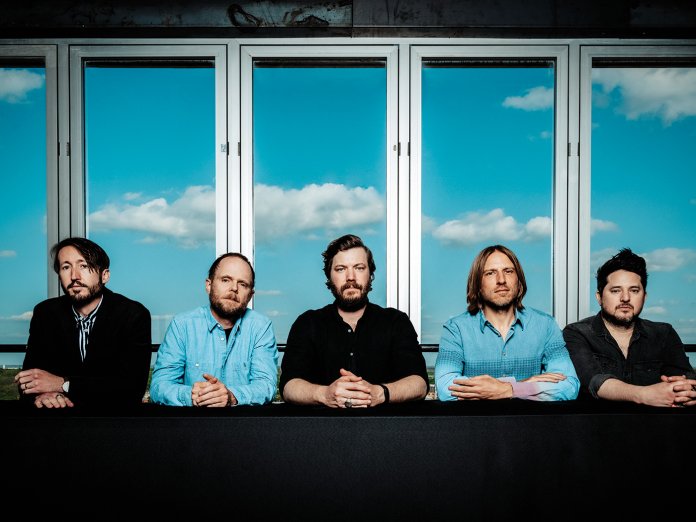It’s been well over eight years since their last album, 2013’s Antiphon, which is a high-risk absence even for a cultish band like Midlake. The interim, however, has been busy with family life and various members’ projects: guitarist Joey McClellan, keyboard player/flautist Jesse Chandler and ...
It’s been well over eight years since their last album, 2013’s Antiphon, which is a high-risk absence even for a cultish band like Midlake. The interim, however, has been busy with family life and various members’ projects: guitarist Joey McClellan, keyboard player/flautist Jesse Chandler and vocalist/bandleader Eric Pulido all released solo LPs, as well as teaming up with Ben Bridwell, Fran Healy, Alex Kapranos, Jason Lytle and bandmate McKenzie Smith to record an LP as BNQT.
If these experiences helped recalibrate and fortify a Midlake in limbo, it seems there was an extra, more personally meaningful push: Chandler’s late father appeared in a dream, telling him that Midlake should reunite. As Pulido explained to Uncut: “A great catalyst for our hiatus in 2014 was the overall health of the band and the desire to invest ourselves in other endeavours. I didn’t want to [get back together] if it was out of obligation and definitely not by dragging everyone along. It was quite the opposite and, although Jesse’s dream did have a powerful and poetic influence, we all had our respective inspiration that collectively brought us to this renewed place.”
Loss and reconnection, then, are core themes of Midlake’s new album, their fifth, along with hope, longing and the passage of time. The cover features an image of Chandler’s father, aged 16, picked out from a crowd shot in the Woodstock movie, while the title points to the importance of youthful idealism down the decades, not just the Bethel Woods festival. The band started work on the record in 2019, though most of it was done during the 2020 shutdown. Since they all admire his work and drummer McKenzie Smith had worked with him on St Vincent and Sharon Van Etten albums, John Congleton was brought in as producer. It seems that having a guide and filter outside of the band allowed Midlake – now officially a quintet, following the departure of bassist Paul Alexander – to make some long overdue changes, not so radical as to reinvent them, but enough to loosen the ties of their signature sound.
For The Sake Of Bethel Woods sees them cutting back on the layered instrumentation and heavily detailed arrangements and lending some songs a new rhythmic muscularity. These are smart moves: despite its allure, Midlake’s blend of strangely foreboding, romantic folk-rock and dreamy AOR can lack variation across a whole album and at times seem overripe, but that’s not the case here. After brief opener “Commune”, in which Pulido urges us to “make time to recall the ones who came before” over warm acoustic guitar, come the punched-up beats and moody, cantering piano of “Bethel Woods”, which opens out with a stretch of tearaway guitar and underlines its theme of escape via a keening vocal (“let’s get out of town, without a sound”). “Feast Of Carrion” is a standout charmer in two parts, the first pegged to a descending keyboard coda, the second a pastoral folk-pop workout, which comes on like Eric Matthews, CS&N and Vashti Bunyan combined.
Very different is “Gone”, another highlight and one of the set’s leaner, more muscular tracks, which opens up the possibility of a future new path for the band. Propelled by an insistent, almost funky rhythm, it features spacey electronic squiggles and winnowing flute and clarinet parts that swoop and soar, all a fine foil for Pulido’s catarrhal croon. The keys-swathed “Meanwhile…” sees the band dusting off their familiar prog-folk melancholia, while the opaque poeticism of “Dawning” is matched with a heaving and darkly spangled, even mystical tune. The set closes with the Grandaddy-ish “Of Desire”: despite the clunkiness of Pulido’s lyrics (“No-one wants to get out of line/Reason should always see eye to eye/Then how did we end up on these sides/Of a hill never needing us to climb”), he’s in good faith, quietly questioning divisiveness and loss of agency until, at the two-thirds mark, there’s a sudden loud outburst, the crash of cymbals, swarming guitars and hammered keys signalling a way through, if not a sure-fix solution.
Given its backdrop, For The Sake Of Bethel Woods could have been a patchy and unconvincing record, the sound of a band unsure of where to move next. Instead, it secures Midlake’s future with small yet significant shifts that haven’t erased their identity. Not deeper waters, necessarily – but running clearer and on a newly energised course.



